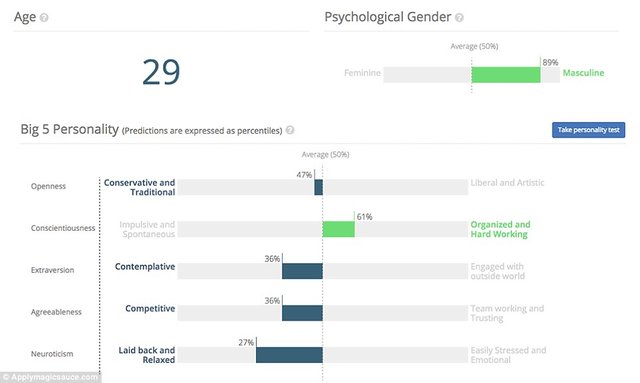Insight #3: Personality Trait Theory - psychological theory that lead Donald Trump and Brexit to WIN

What exactly is personality and how can this extremely imprecise term be understood scientifically? Throughout the 20th century psychologists have tried to conceptualize human personality in various ways. Freud, behaviouralists, cognitive or humanistic psychologists - they all looked at personality in a different way. However, today I will describe the most widely accepted by the scientific community theory of personality, namely the theory of personality traits. You will also learn how contemporary theories of personality influence the political world!
What is personality trait?
) The basic characteristics of personality change slightly throughout life.
(image source)
The basic characteristics of personality change slightly throughout life.
(image source)
The Three-factor Model
Hansa Eysenck by means of the factorial analysis distinguished three independent and universal factors which he considered to be the basis of personality. According to Eysenck, these three dimensions can be used to describe the most important core of human personality. These dimensions are largely based on what we today call temperament. The three main factors are as follows:
1. Extraversion
People with a high level of extraversion are more sociable, active and looking for experiences. They tend to be carefree, optimistic and impulsive, they are also more easily bored than people with low extroversion. Introverts - people at the other end of this spectrum - are more reserved, trying to control emotions more and plan their behaviour in advance more often than extraverts. They tend to be more pessimists than extraverts and more serious and reliable. The introversion-extraversion dimension of Eysenck was taken from Carl Gustav Jung's, but this Swiss psychiatrist defined it in a slightly different way.
2. Neuroticism
Neuroticism (or emotionality) is a characteristic that describes the degree of feeling such emotions as anxiety, depression, feeling of guilt, as well as having a low self-esteem or experiencing tension. Neurotics also have a lower resistance to stress. At the other end of the spectrum there is an emotional balance and stability.
3. Psychoticism
Psychoticism was selected in Eysenck's later studies and is linked to hostility, aggression and anti-social behaviour, but is also linked to "general" mental health. It takes primacy over extroversion and neuroticism. Thus, the degree of psychoticism affects the dimensions of neuroticism and extraversion. Extreme psychotics are characterized by symptoms related to mental disorders, while moderate psychotics can manifest in rebellious character and nonconformism. The opposite of psychoticism is supposed to be conventionalism, conformism and high level of socialization.
Eysenck believed that each of these traits had strong biological determinants. Extraversion/introversion is associated with stimulation and inhibition processes of cortical arousal. This in short concerns how intensively we react to the stimuli and how long our reaction lasts. Studies have shown that introverts are constantly over-aroused and extraverts are constantly under-aroused. Due to the fact that introverts experience stimuli more intensively, they are more likely to feel "overstimulated", so they do not look for new sources of more intense stimuli, as extroverts do.
Therefore Eysenck formulated the so-called drug postulant, which describes the asymmetry of stimulant and sedative drugs for introverts and extraverts. Paradoxically, when an introvert takes sedative medication, he will become more extraverted because his strong stimulation will be inhibited, so that will be able to seek more stimuli (and may become, for example, become more talkative and sociable). On the other hand, for extraverts stimulants are drugs that will have a more "calming" effect and will shift them towards more introverted behaviour, as they will provide the extraverts with an additional stimulation that they are looking for so much.
The physiological basis of neuroticism may be related to differences in activation thresholds in limbic system. Limbic system is responsible for emotional reactions and "fight-or-run" actions in the face of danger (or "danger" that trying to talk to women can be for young men ;). Eysenck suggested that psychoticism may be related to the level of testosterone, but this was not confirmed in the research. Nowadays, it is suspected that psychotics may be associated with monoamine oxidase.
"Big Five", or the Five-factor Model
Paul Costa and Robert McCrae identified five personality dimensions. Their model is currently the most widely accepted model of personality in psychology. It is used in hundreds of thousands of studies. The authors created their theory by analysing statistically the adjectives that the respondents defined themselves in the research, based on the lexical hypothesis - the statement that all the most important personality traits of an individual are expressed in the language and vocabulary it uses. Let's move on to the factors!
1. Openness to experience
It is the degree to which an individual seeks and appreciates new experiences. These may include, for example unusual ideas, different cultures, new ways of spending free time, adventures, exploring art. It is more like for people who are open to experience to go the gallery of contemporary art or to appreciate performance art. Their opposites will prefer rather conventional forms of art. Individuals who are open to experience could also choose in restaurants dishes that they have not tried yet, while more "constant" people will rather choose one of their favourite dishes.
2. Conscientiousness
Conscientiousness determines the level of self-discipline, fulfilment of duties, perseverance in striving for goal and organization. People low on conscientiousness tend to be "a flash in the pan", but they also are better at improvisation and have a greater degree of flexibility.
3. Extraversion
It basically means the same as in the three-factor model - talkativeness, experiencing positive emotions, energy, the search for stimulation, but also assertiveness and dominance in the group. Introversion is associated with greater reflectiveness and less social activity, as well as greater absorption of oneself.
4. Agreeableness
It defines the tendencies for cooperation, conformism, compassion and altruism. People with high agreeableness are usually helpful, but they can also be naive. People with low agreeableness are more suspicious, they are also more competitive and nonconformist. They can be seen as quarrelsome and selfish.
5. Neuroticism
Neuroticism, or emotional instability is a tendency to feel negative emotions, same as in the three-factor model. People with high neuroticism experience more anxiety, emotional fluctuations, it is more difficult for them to relax and they get angry more often. It is also related to sensitivity. Woody Allen is a well-known neurotic in pop-culture (just like almost all the main characters in his films).
Personality Trait Theory Changes the World
 Michał Kosinski - a psychologist who indirectly
Michał Kosinski - a psychologist who indirectly changed the geopolitical map (image source)
It is assumed that a similar algorithm was used for the Donalnd Trump and Brexit campaigns. By setting out in detail the distribution of personality traits in particular regions and cities, campaigners were able to select the content of messages and speeches in the cities in order to "hit the right notes" and thus increase the effectiveness of winning. This can be described as a "precise surgical cut" compared to the previous designs of a campaigns based on very general sociological research. Some people complain to Kosinski that he has opened Pandora's box, but he says "It's not my fault. It was not me who built the bomb. I only showed that it does exist".
 A fragment of a sample profile from the Apply Magic Sauce website
(image source)
A fragment of a sample profile from the Apply Magic Sauce website
(image source)


Insightful article, personality tests are odd.
Watch out for personality tests online - 98% of them are worth nothing, they have no value and were not tested psychometrically. If you want to take a valid personality test you gave to visit a psychologist. This algorithm which I posted is not a test and is not as reliable as psychological test, but it has quite high accuracy.
oh i know, i studied this recently actually. I took an interesting and apparently scientifically attested one online for my psychology course, but it is more thought provoking rather then accurate. It even comes with a disclaimer, and says that if someone you know well such as your family or partner or close friend thinks that it doesnt describe you accurately, its wrong. However, some of the questions were really unspecific and made me think real deep about the meaning and what I in fact feel or think. It was interesting, to say the least.
This post has received a 2.94 % upvote from thanks to: @saunter.
thanks to: @saunter.
For more information, click here!!!!
The Minnowhelper team is still looking for investors (Minimum 10 SP), if you are interested in this, read the conditions of how to invest click here!!!
The theory of eysenck is considerably interesting to explain how individuals behave, however it stipulates that these personality traits do not change. Jung explained in his book the social insensitive that there are actually two types of personalities, the introvert and the extrovert but, unlike the previous position, he stipulates that depending on the moment we can be one or the other. And he has a lot of reason to be, he even does it with an example, two friends enter a castle and one of them does not want to do it because it is private property, the other thinking about individual interests incites him to enter, when he finally enters the introvert he sees many books and begins to explore them, while the extroverted as it did not interest him, stays aside. You can go through my blog, you'll be interested in my last post about neurosciences
I'm very familiar with jungian thought :) Modern stance is that it changes in a lifetime but not drastically unless there's a intensive peak experience like war or car accident
Oh wow, lemme check on my Facebook likes then.
But what about ambiverts??? These personality tests to find out people traits should be continuously used in improving the workplaces too.
I like how it is being implemented in our BPOs here but I doubt if this is already being done in the government offices... 🤔
Upon checking the link, ugh I'm too late to see what my Facebook likes says about me! The heck with the Facebook privacy issue.